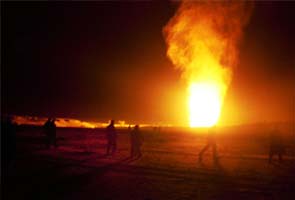An Eni SpA oil pipeline ruptured and caught fire as a militant group claimed responsibility for an attack in the region, their first alleged assault in months as its purported leader awaits trial on terrorism charges in South Africa.
 The Movement for the Emancipation of the Niger Delta also threatened to attack South African interests in an email sent to journalists late on Saturday night, as its alleged leader Henry Okah remains imprisoned there.
The Movement for the Emancipation of the Niger Delta also threatened to attack South African interests in an email sent to journalists late on Saturday night, as its alleged leader Henry Okah remains imprisoned there.South African businesses "will pay a heavy price for the interference of (President) Jacob Zuma in the legitimate fight for justice in the Niger Delta, by its people," the statement read.
"The South African president has reduced himself to the position of a hired thug."
South African businesses, like mobile phone carrier MTN Group Ltd. and others, have operations throughout Nigeria, Africa's most populous nation with more than 160 million people. While other MEND threats have failed to materialize in the past, Saturday's apparent attack could mean the militant group is willing to begin its assaults again.
South African businesses, like mobile phone carrier MTN Group Ltd. and others, have operations throughout Nigeria, Africa's most populous nation with more than 160 million people. While other MEND threats have failed to materialize in the past, Saturday's apparent attack could mean the militant group is willing to begin its assaults again.
The fire happened on Saturday night near Brass River in Nigeria's Bayelsa state, home to the nation's President Goodluck Jonathan. Witnesses told a local environmental group they heard the blast from their homes.
In its email, the militant group known by the acronym MEND said it "attacked and destroyed" the pipeline run by a Nigerian subsidiary of Eni. Officials with the Rome-based company declined to immediately comment Sunday.
Lt. Col. Timothy Antigha, a spokesman for the military in the restive region, acknowledged "claims of a fire" on the pipeline, but said soldiers could not independently verify it.
The attack occurred in the oil-rich Niger Delta, where foreign firms have pumped oil out of the country for more than 50 years. Despite the billions of dollars flowing into Nigeria's government, many in the delta remain desperately poor, living in polluted waters without access to proper medical care, an education or work.
In 2006, militants from groups like MEND started a wave of attacks targeting foreign oil companies, including bombing their pipelines, kidnapping their workers and fighting with security forces. That violence ebbed in 2009 with a government-sponsored amnesty program promising ex-fighters monthly payments and job training. However, few in the delta have seen the promised benefits and scattered kidnappings and attacks continue.
MEND itself, once a powerful, media-friendly militant group in the region, has seen its influence wane over the last year. Its largest major confirmed attacks were a dual car bombing in Nigeria's capital Abuja on Oct. 1, 2010, that killed at least 12 people and the November 2010 kidnapping of seven expatriate workers from offshore oil rigs operated by London-based Afren PLC and Exxon Mobil Corp.
After the Abuja bombings, authorities in South Africa arrested Okah on terrorism charges. His trial there is scheduled to begin Oct. 1.
Okah has repeatedly denied being the leader of the militant group, though Nigeria's government has labelled him as a major arms importer to the region. South African prosecutors also have presented evidence in earlier hearings drawn from Okah's diaries and computer correspondence that they said bolstered accusations he masterminded the October bombings.
No comments:
Post a Comment